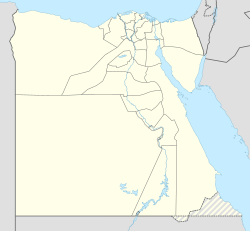Menouf
Menouf
منوف ⲡⲁⲛⲟⲩϥ | |
|---|---|
City | |
 Location in Monufia Governorate | |
| Coordinates: 30°27′57″N 30°55′51″E / 30.465839°N 30.930805°E | |
| Country | |
| Governorate | Monufia |
| Area | |
• Total | 17.40 km2 (6.72 sq mi) |
| Elevation | 20 m (70 ft) |
| Population (2021)[1] | |
• Total | 125,707 |
| • Density | 7,200/km2 (19,000/sq mi) |
| Time zone | UTC+2 (EST) |
Menouf (Template:Lang-ar, from Template:Lang-cop) is a city in Egypt located in the Nile Delta.[2] It has an area of 18.76 square kilometers.[3] The city gave name to the Monufia Governorate that it is located in and it was the capital of the governorate until 1826. Menouf is one of the several continually inhabited ancient Egyptian cities in the governorate.
Name
Menouf was formerly called Minuf al-Ulyah (Template:Lang-ar),[4] which comes from Template:Lang-cop (with variants ⲉⲛⲟⲩϥⲓ ⲣⲏⲥ and ⲁⲛⲟⲩϥⲉ). "The upper" in this case also means "southern", i.e. located upriver in relation to the Nile's flow (see Upper Egypt), which was used to differentiate it from Minuf as-Sufli (Template:Lang-ar, Template:Lang-cop),[5] modern Mahallat Menouf.
The Coptic name Panouf in turn is derived from Template:Lang-egy. The city's Greek name Onouphis (Template:Lang-grc) comes from the Egyptian name as well.[5]
History
Panouf was a bishopric by the middle of the fourth century as evidenced by the attendance of Bishop Adelphis of Onouphis at a synod in Alexandria in 362.
During the Heraclean revolt the city was an important center of the Blues, loyal to the emperor Phocas. General Bonasus gave battle to the rebels east of Panouf and defeated them, but the city was captured by Nicetas in a short while.[6]
By the 19th century the city went into decline. It had no gardens, its streets were narrow and dirty, and its houses small and badly constructed. The people drank the Nile water.[7]
Notable people
See also
References
- ^ a b c "Minūf (Kism (fully urban), Egypt) - Population Statistics, Charts, Map and Location". citypopulation.de. Retrieved 17 June 2023.
- ^ "About Menouf". monofeya.gov. Archived from the original on 2018-02-22. Retrieved 2018-11-20.
- ^ "الصفحة الرئيسية - منوف". Archived from the original on 2014-04-24. Retrieved 2012-01-28.
- ^ Stewart, Randall. "Minuf Al-'Ulyah". Claremont Colleges Digital Library. Retrieved 10 July 2020.
- ^ a b Peust, Carsten. "Die Toponyme vorarabischen Ursprungs im modernen Ägypten" (PDF). p. 65.
- ^ Howard-Johnston, James (2021). The Last Great War of Antiquity. Oxford University Press. pp. 38–58. ISBN 978-0-19-883019-1.
- ^ Mitchell, John Kearsley (1849). On the Cryptogamous Origin of Malarious and Epidemic Fevers. Lea and Blanchard.





